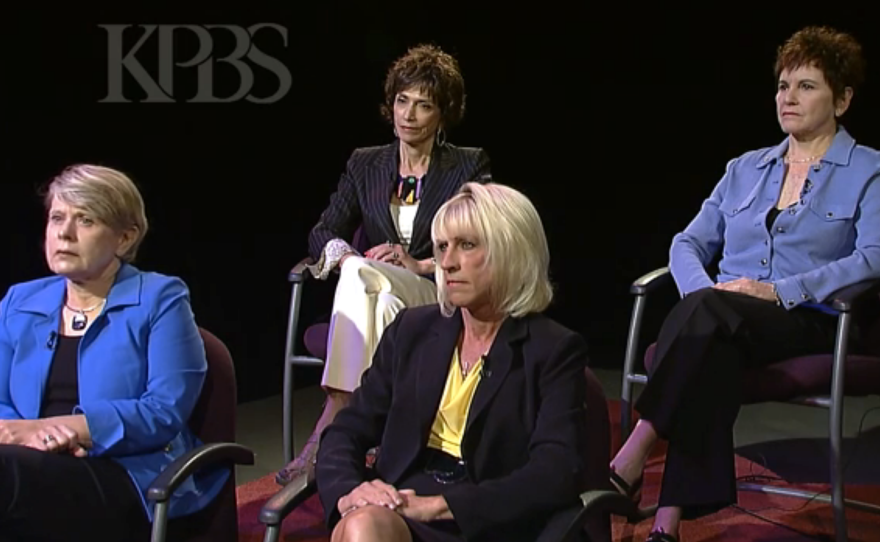Bob Filner’s resignation as San Diego’s mayor after only nine months in office revealed a mix of progress and status quo when it comes to sexual harassment.
The scandal showed power still spawns abuse, and women still choose silence, but when they do speak up, change can be speedy.
“What has not changed is the fact that men will still behave badly, that women will still have similar reactions," said former San Diego City Councilmember Donna Frye.
"They’re afraid to talk about it. They feel embarrassed. They’re ashamed. They feel no one will believe them,” she said.

Frye was one of three Democratic former supporters of Filner who brought to light sexual harassment allegations against the former mayor. She said she's spoken to dozens of women over the last several months about the experiences they said they had with Filner. Most of the women were shocked and unsure of what to do after they were approached, while others reacted quickly, she said.
“There were many stories where women came to me and did exactly what they should have done," Frye said. "They reported it. They went to people and were told just to ignore it, just forget about it. Why didn’t they just say, 'That’s bad behavior, we’re going to talk to him and tell him it’s not acceptable'?"
Employment mediator Abby Silverman Weiss believes Filner’s conduct went unchecked also because he dealt with women from different workforces and could therefore isolate them.
“And that is the conduct of a serial sexual harasser," Silverman Weiss said. "In a single workplace, what that person may do is look for new employees who haven’t figured out networks if something offensive or uncomfortable happens.”
There were more than 7,500 cases of sexual harassment in the U.S. in 2012, according to the Equal Employment Opportunity Commission. Silverman Weiss said the problem is likely more pervasive than the numbers suggest because many instances go unreported. Fear of job loss, promotion denials and a reluctance to be perceived as victims remain strong deterrents for younger women to bring forward sexual harassment complaints.
"What’s notable about the Filner case," Silverman Weiss said, "is most of the women who spoke up did so from a position of strength."
“They were really accomplished women who could afford to go public," she said. "They were really established in their careers or at the end of their careers. “

Retired U.S. Navy Rear-Admiral Ronne Froman was one of four high profile women who spoke publicly about unwanted sexual advances from Filner.
“I thought there was safety in numbers," Froman said. "If any one person came out individually, there could have been major repercussions. Heck, there were repercussions with the group of us coming out, horrible things were said about us."
The criticism from certain corners echoed past negative portrayals of women who accuse powerful men of bad behavior. Congresswoman Susan Davis said the disparagement is partly political.
“We do tend to not believe often that someone who is doing a meritorious job in some areas could be having a problem," Davis said.
Filner served in Congress for two decades before he was elected San Diego mayor last November. And the allegations from some of his accusers dated back several years. Davis said Filner’s alleged conduct in D.C. may not have been caught because he was one of 435 congressional members and likely shielded by a protective staff. But once Filner became mayor, San Diegans clearly showed they had little tolerance for such misconduct.
“It is pretty remarkable,” said Davis.
Most observers said the Filner scandal has raised the public consciousness about sexual harassment. Since July, when the story first broke, there has been a 19.5 percent increase in requests to schedule harassment prevention trainings, according to the San Diego Employers Association.
Former Councilwoman Frye said the Filner case illustrated that even well-intentioned management can get it wrong. Almost immediately after Filner’s accusers stepped forward, city hall issued a directive barring women from working with him alone.
“I thought it was very ironic that in order to protect women from Bob Filner and protect them from possibly being harassed, that we will discriminate against them, which is also something that is not legal,” Frye said.
Froman said the crux of flawed edicts and harassment itself is that women are still treated as second-class citizens, almost universally. She pointed to pay gaps and glass ceilings on one end, and on the other, she said San Diegans need to look no further than El Cajon Boulevard, where young girls are sold for sex. Globally, child bride marriages in the Mideast and Asia, and female mutilation in Africa are still tolerated.
“We need to start treating our women as human beings, as people and as equals," Froman said.
Only honesty, continued dialogue and accountability, Froman said, will bring change.
“I think what so surprises me and so makes me angry is that people now think that just because Filner is gone, it’s no longer an issue," she said. "Well, it is an issue all across this country and all across this world."







